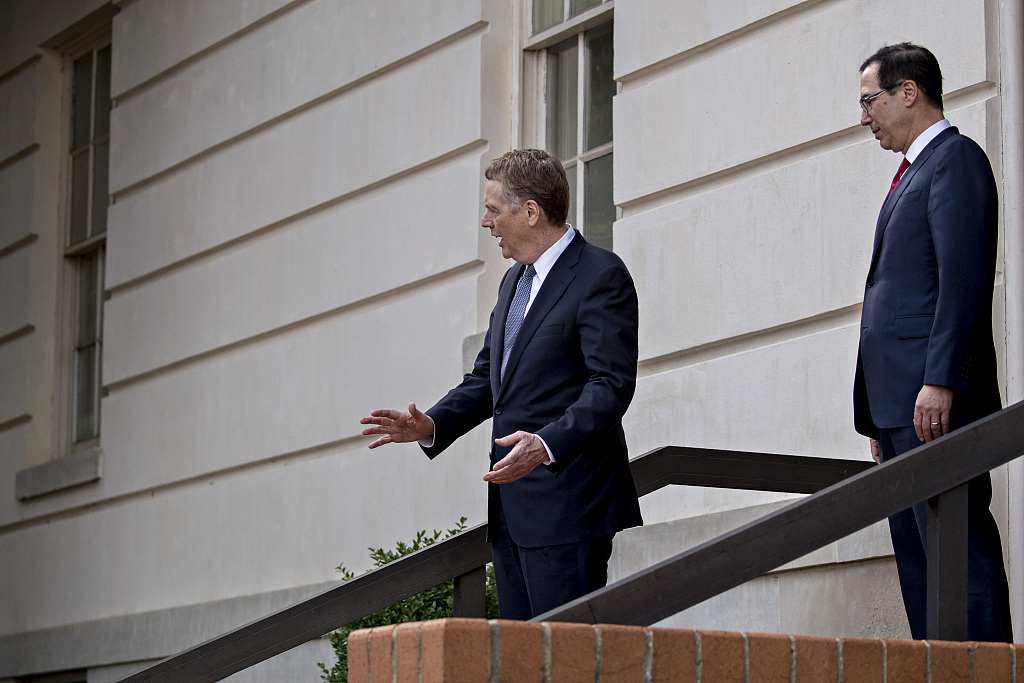Was Donald Trump being honest about tariffs?
Posted By: Ahmed on 14-05-2019 | 06:58:33Category: Political Videos, NewsEditor's Note: Adam Garrie is the director of the UK-based global policy and analysis think tank Eurasia Future and co-host of the talk show "The History Boys." The article reflects the author's opinion, and not necessarily the views of CGTN.
The trade conflict between Washington and Beijing has again escalated as the U.S. threatened to slap new tariffs on 300 billion U.S. dollars of Chinese imports, and China, in retaliation, announced on Monday to impose tariffs on 60-billion-U.S.-dollars' worth of American products.
U.S. President Donald Trump made some very bold claims earlier on social media about the nature of tariffs and how the escalation in the China-U.S. trade war will impact the U.S. consumer, international business firms and China.
First of all, Trump contradicted one of his own advisers and stated that China will pay for the new tariffs as opposed to U.S. consumers having to pay for the new tariffs. This is simply not the case. A tariff is not an export license but is an import tax.
This tax is paid by the company or individual importing the goods. As such, it will be American importers who will pay the tax to the U.S. government and as is virtually always the case in such circumstances, in order to maintain revenue streams, the added costs will be passed on to consumers in the form of increased prices for goods.
Anyone who has ever imported luxury goods from a nation that does not have a free trading agreement with one's home country will be familiar with filling in tedious forms and paying a costly fee in order to clear one's goods at customs.
Trump then stated that one of the reasons why he alleges that U.S. consumers will not pay for the tariffs is "because China subsidizes product to such a large degree." This is misleading.
As part of steps to broaden and widen reform and opening-up, China is, in fact, cutting subsidies and simultaneously cutting the regulatory and tax burden in order to allow successful private companies greater market flexibility while utilizing market forces to incentivize reform among less productive entities.
In any case, subsidization and tariffs are unrelated concepts. Corporate subsidies are an entirely domestic matter and tariffs come into play only when one's goods are being traded to a country that enacts tariffs.
A further point to consider is that while China is cutting both subsidies and taxation, Trump has pledged to increase subsidies to the U.S. farmers whose businesses have been harmed by his anti-China trade war.
In what appeared to be a contradiction of his earlier remarks, Trump then said that if Americans want to avoid paying the increased cost of tariffed goods, they should buy from a non-tariffed country or buy American-made goods. This statement does not reflect the realities of 21st-century production.
It goes without saying that when a domestically produced good is cheaper, of higher quality or both when compared with an import, one will buy a domestic good. Trade exists for the very reason that there are some goods not made in one's own country or in other cases, foreign countries make better or less costly goods than goods available domestically.

This, for example, is why beginning in the 1970s, many Americans began buying European cars because of their perceived higher quality as well as Asian cars due to their perceived higher efficiency.
As China produces high tech equipment for export and is well on its way to becoming a global capital of innovation, there are certain products made in and created in China that simply cannot be substituted by domestic goods or other imports.
Trump then stated that China-based companies will take their businesses out of China and relocate to other countries. This statement does not reflect reality. As a result of ever further reform and opening up, China's domestic market is one of the most sought after in the world. Thanks to modernized and streamlined investment laws, it is now easier for foreign companies to do business in China than at any time in contemporary history.
Many companies including American ones are opening new production and distribution facilities in China so that they can sell directly to Chinese consumers. Also, as China exports goods to just about every country in the world, it is insulting for Trump to suggest that China will somehow be closed for business just because of his new tariffs.
As China's trade surplus with the U.S. actually increased after the first full year of Trump's trade war, the statistics, as well as common sense, indicate that Trump's ominous prediction is mistaken.
Finally, Trump stated that China "had a great deal, almost completed, & you backed out!" It remains China's intention to agree to a win-win trade deal as soon as possible. This is why China continues to prioritize dialogue with the U.S. in spite of Trump's caustic tones.
There is every intention on the part of Beijing to reach a conclusion to a trade war that China and the U.S. Chamber of Commerce each opposed from the beginning.

 Breaking Tacking Shaking Bring Bring News... America Ne Badi Khushkhabri Suna Di Good Good Good
Breaking Tacking Shaking Bring Bring News... America Ne Badi Khushkhabri Suna Di Good Good Good
 Badi Breaking Tacking Acking News... Tofani Daryai Barish Alertttt...
Badi Breaking Tacking Acking News... Tofani Daryai Barish Alertttt...
 Ali Amin Gandapur ki zamanat me tausee
Ali Amin Gandapur ki zamanat me tausee
 Breaking Tacking Acking Jacking Lacking Bucking News... War War War
Breaking Tacking Acking Jacking Lacking Bucking News... War War War







